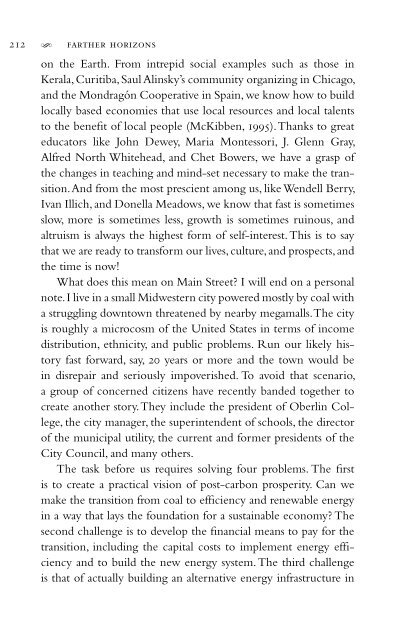Down to the wire : confronting climate collapse / David - Index of
Down to the wire : confronting climate collapse / David - Index of
Down to the wire : confronting climate collapse / David - Index of
Create successful ePaper yourself
Turn your PDF publications into a flip-book with our unique Google optimized e-Paper software.
S<br />
212 far<strong>the</strong>r horizons<br />
on <strong>the</strong> Earth. From intrepid social examples such as those in<br />
Kerala, Curitiba, Saul Alinsky’s community organizing in Chicago,<br />
and <strong>the</strong> Mondragón Cooperative in Spain, we know how <strong>to</strong> build<br />
locally based economies that use local resources and local talents<br />
<strong>to</strong> <strong>the</strong> benefi t <strong>of</strong> local people (McKibben, 1995). Thanks <strong>to</strong> great<br />
educa<strong>to</strong>rs like John Dewey, Maria Montessori, J. Glenn Gray,<br />
Alfred North Whitehead, and Chet Bowers, we have a grasp <strong>of</strong><br />
<strong>the</strong> changes in teaching and mind-set necessary <strong>to</strong> make <strong>the</strong> transition.<br />
And from <strong>the</strong> most prescient among us, like Wendell Berry,<br />
Ivan Illich, and Donella Meadows, we know that fast is sometimes<br />
slow, more is sometimes less, growth is sometimes ruinous, and<br />
altruism is always <strong>the</strong> highest form <strong>of</strong> self-interest. This is <strong>to</strong> say<br />
that we are ready <strong>to</strong> transform our lives, culture, and prospects, and<br />
<strong>the</strong> time is now!<br />
What does this mean on Main Street? I will end on a personal<br />
note. I live in a small Midwestern city powered mostly by coal with<br />
a struggling down<strong>to</strong>wn threatened by nearby megamalls. The city<br />
is roughly a microcosm <strong>of</strong> <strong>the</strong> United States in terms <strong>of</strong> income<br />
distribution, ethnicity, and public problems. Run our likely his<strong>to</strong>ry<br />
fast forward, say, 20 years or more and <strong>the</strong> <strong>to</strong>wn would be<br />
in disrepair and seriously impoverished. To avoid that scenario,<br />
a group <strong>of</strong> concerned citizens have recently banded <strong>to</strong>ge<strong>the</strong>r <strong>to</strong><br />
create ano<strong>the</strong>r s<strong>to</strong>ry. They include <strong>the</strong> president <strong>of</strong> Oberlin College,<br />
<strong>the</strong> city manager, <strong>the</strong> superintendent <strong>of</strong> schools, <strong>the</strong> direc<strong>to</strong>r<br />
<strong>of</strong> <strong>the</strong> municipal utility, <strong>the</strong> current and former presidents <strong>of</strong> <strong>the</strong><br />
City Council, and many o<strong>the</strong>rs.<br />
The task before us requires solving four problems. The fi rst<br />
is <strong>to</strong> create a practical vision <strong>of</strong> post-carbon prosperity. Can we<br />
make <strong>the</strong> transition from coal <strong>to</strong> effi ciency and renewable energy<br />
in a way that lays <strong>the</strong> foundation for a sustainable economy? The<br />
second challenge is <strong>to</strong> develop <strong>the</strong> fi nancial means <strong>to</strong> pay for <strong>the</strong><br />
transition, including <strong>the</strong> capital costs <strong>to</strong> implement energy effi -<br />
ciency and <strong>to</strong> build <strong>the</strong> new energy system. The third challenge<br />
is that <strong>of</strong> actually building an alternative energy infrastructure in
















